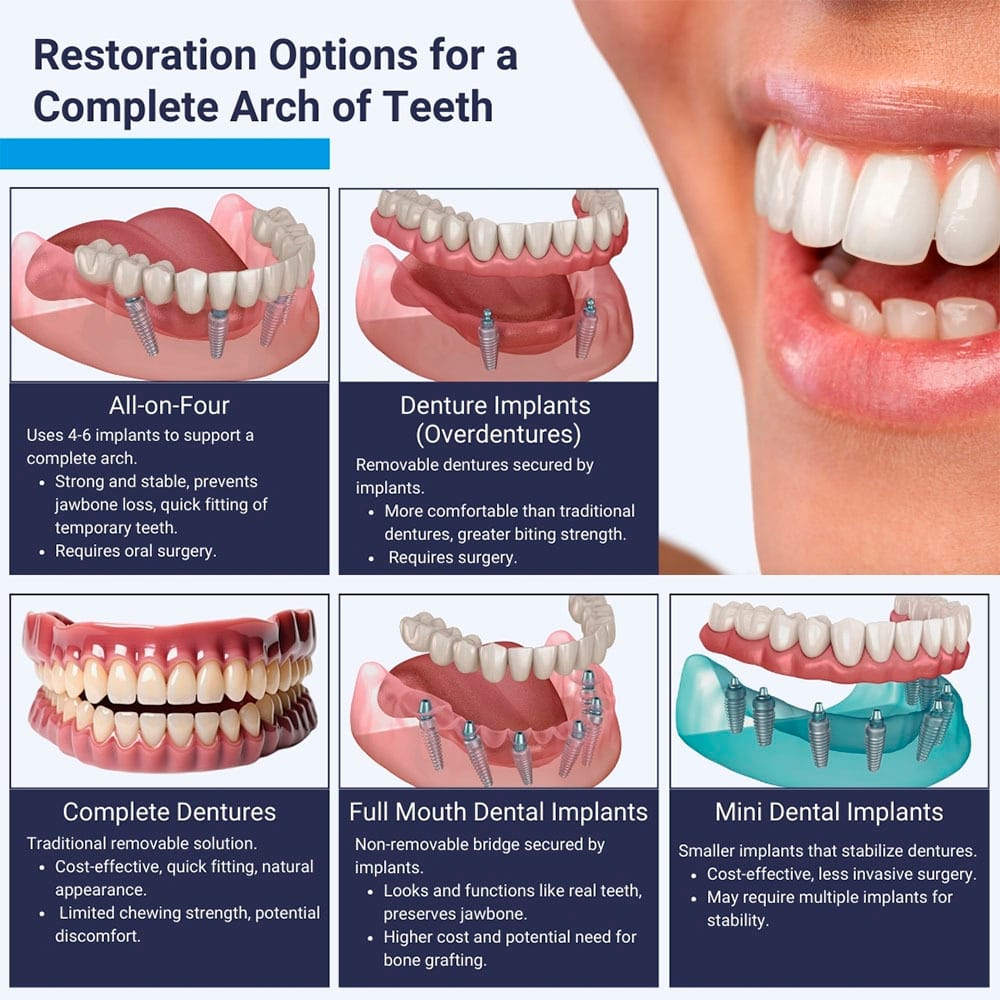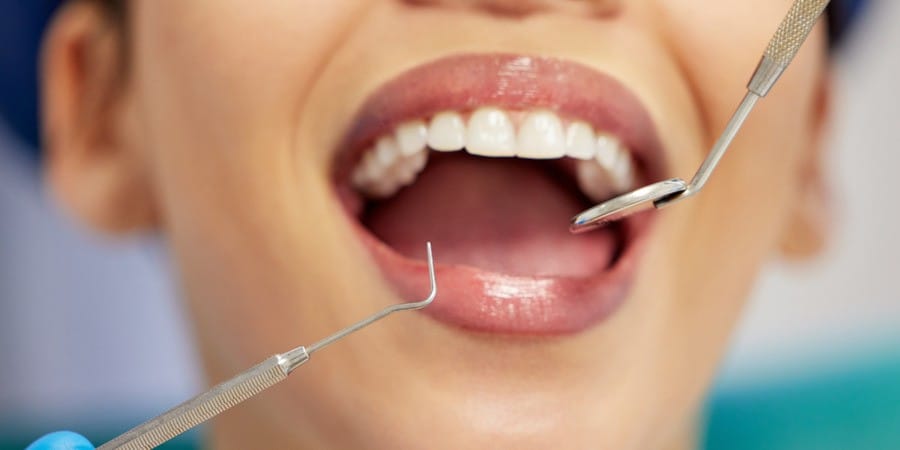What Can Cause Full Mouth Tooth Loss?
Reasons for complete tooth loss can include:
- Severe periodontitis (gum disease).
- Severe tooth decay.
- Dental trauma.
- Health issues like diabetes or osteoporosis.
What Are the Consequences of Failing to Restore a Complete Arch of Teeth?
The consequences of complete tooth loss include:
- Jawbone deterioration will affect your facial structure, causing facial features to collapse inward.
- Difficulty eating a wide range of nutritious foods due to problems chewing.
- Speech difficulties.
- Lower self-esteem and self-confidence.
These are all problems we can address successfully with our choice of treatments to restore complete arches of teeth. Your options include:
- Complete dentures
- Mini dental implants
- All-on-4 dental implants
- Full mouth dental implants
- Denture implants

Complete Dentures
Complete or full dentures are a traditional solution for tooth loss. The denture rests directly on your gums and replaces your upper or lower arch of teeth. The acrylic gum-colored denture base holds natural-looking denture teeth.
Advantages and Disadvantages of Choosing Complete Dentures
Advantages can include:
- Treatment is cost-effective.
- A full denture is non-invasive to make and fit; no surgery is required.
- Your full denture can be completed and ready to fit in just a few weeks.
- Modern, high-quality denture teeth can closely replicate the appearance of natural teeth.
Disadvantages can include:
- Dentures lack the chewing and biting strength of natural teeth, so some foods are tricky to eat or off the menu entirely.
- Full dentures can become ill-fitting as jawbone resorption occurs, resulting in a lack of retention.
- Because the dentures rest directly on your gums, they place pressure on the jawbone underneath and can accelerate jawbone loss.
- Ill-fitting dentures can be uncomfortable or painful to wear.
Mini Dental Implants
Mini dental implants are similar to traditional implants but have a narrower diameter. They can be used to secure and stabilize dentures successfully. Mini dental implant dentures have special ball and socket attachments, allowing you to snap the denture firmly in place.
Advantages and Disadvantages of Choosing Mini Dental Implants
Advantages can include:
- Treatment is cost-effective due to the smaller size of the implants.
- Mini dental implants can be inserted directly through the gum, making surgery quicker.
- Because they are smaller, mini dental implants need less strong and healthy bone, so there is less likelihood of requiring a bone graft.
Disadvantages can include:
- Since they are smaller, a greater number of mini dental implants may be needed to secure a loose denture. The more implants that are required, the higher the overall price.
- Mini dental implants may be less suitable for securing an upper denture due to the sinus cavities on either side of the nose. Your jaw tends to be thinner in these areas and may be less suitable for implants.
All-on-4 Dental Implants
All-on-Four dental implants require just four or six implants to secure a complete arch of upper or lower teeth. The implants are inserted in a specific way toward the front of the jaw, where the jaw is usually thicker and stronger, providing good support for a replacement arch of teeth. Treatment can be used to secure a non-removable implant bridge.
Advantages and Disadvantages of Choosing All-on-4 Dental Implants
Advantages can include:
- Treatment is affordable as only four or six dental implants are needed. We may recommend using six implants if you need to replace an upper arch of teeth and require extra strength and stability.
- Inserting the implants in the bone where it is naturally strongest helps avoid or reduce the risk of requiring bone grafting.
- All-on-Four teeth are strong, stable, and non-removable, giving you a biting and chewing strength similar to real teeth.
- Jawbone resorption is prevented around the dental implants.
- You may be fitted with a temporary set of teeth on the same day as oral surgery. These are worn while your implants heal.
Disadvantages can include:
- Oral surgery is needed to insert the implants.
- Some people may find the restoration slightly bulky since it may need to replace gum and teeth. We can discuss this issue with you in greater detail during your initial consultation.
Full Mouth Dental Implants
With full mouth dental implants, you receive a non-removable bridge secured to the implants and inserted evenly throughout your jawbone. A full mouth dental bridge can restore up to 12 teeth. We can make this restoration from the highest quality zirconia, which is entirely metal-free.
The result is a restoration that looks and feels similar to real teeth, providing a similar level of biting and chewing strength.
Advantages and Disadvantages of Choosing Full Mouth Dental Implants
Advantages can include:
- Your implant teeth are non-removable and are designed to look and function like real teeth.
- Your jawbone around the implants is protected and preserved, preventing jawbone resorption.
- Your biting and chewing strength is similar to natural teeth.
- We may be able to fit a temporary bridge on the same day of surgery.
Disadvantages can include:
- Treatment can be expensive since you will probably need a greater number of dental implants to secure your bridge.
- You may need bone grafting since the implants would be inserted along your arch.
Denture Implants
With denture implants, you would receive a denture that clips firmly onto implants in your jawbone. You can easily remove and insert the denture, but it is securely held in place while in the mouth.
Implants support the denture, so it won’t rest directly on your gums, making it much more comfortable to wear. This type of restoration is also sometimes called an overdenture.
Advantages and Disadvantages of Choosing Denture Implants
Advantages can include:
- Treatment is more affordable compared with a fixed bridge of teeth.
- A removable dental appliance may be easier to care for.
- Biting and chewing strength is greater compared to an ordinary denture.
Disadvantages can include:
- Oral surgery is still needed to insert the implants.
- You may need other procedures like bone grafting to prepare your jawbone for implants.
- Biting and chewing strength aren’t as strong as a fixed implant bridge.
Deciding how to replace an entire arch of teeth is a big decision, but we are here to help and guide you and provide you with all the information you need to make the right choice.
When you visit Clock Tower Dental, we can discuss your treatment goals, show you examples of each solution, and provide a custom treatment plan, including a detailed breakdown of potential costs.

